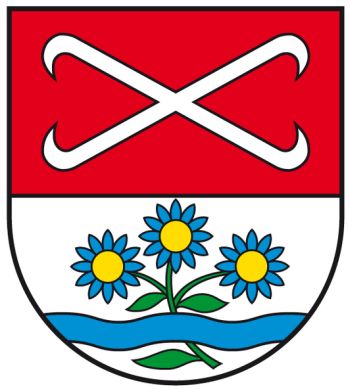Sülldorf: Difference between revisions
Knorrepoes (talk | contribs) No edit summary |
Knorrepoes (talk | contribs) |
||
| Line 20: | Line 20: | ||
The arms were officially granted on September 3, 1996. | The arms were officially granted on September 3, 1996. | ||
The two salt-hooks in the upper half are derived from the arms of the Bernd family, one of the most famous of the families that | The two salt-hooks in the upper half are derived from the arms of the Bernd family, one of the most famous of the families that ran the salt mines in the area for many centuries. Saltmining has been of great importance for the local economy. | ||
The base shows the Sülze river and a sea- or salt-aster (''Aster tripolium'', now ''Tripolium pannonicum''), a typical salt-loving plant in the area and symbol for many such plants | The base shows the Sülze river and a sea- or salt-aster (''Aster tripolium'', now ''Tripolium pannonicum''), a typical salt-loving plant in the area and symbol for many such plants around the village. | ||
[[Literature]] : Website of the municipality http://www.gemeinde-suelzetal.de | [[Literature]] : Website of the municipality http://www.gemeinde-suelzetal.de | ||
Revision as of 06:13, 24 June 2012
| Heraldry of the World Civic heraldry of Germany - Deutsche Wappen (Gemeindewappen/Kreiswappen) |
SÜLLDORF
State : Sachsen-Anhalt
District (Kreis) : Börde (1994-2007 Bördekreis, until 1994 Wanzleben)
Incorporated into : 2001 Sülzetal
Official blazon
Geteilt Rot über Silber; oben zwei schräggekreuzte gerundete silberne Doppelhaken, unten am grünen dreiblättrigen Blütenstengel drei blaue Salzasternblüten mit goldenen Samenkapseln, der Blütenstengel belegt mit einer blauen Wellenleiste.
Origin/meaning
The arms were officially granted on September 3, 1996.
The two salt-hooks in the upper half are derived from the arms of the Bernd family, one of the most famous of the families that ran the salt mines in the area for many centuries. Saltmining has been of great importance for the local economy.
The base shows the Sülze river and a sea- or salt-aster (Aster tripolium, now Tripolium pannonicum), a typical salt-loving plant in the area and symbol for many such plants around the village.
Literature : Website of the municipality http://www.gemeinde-suelzetal.de

